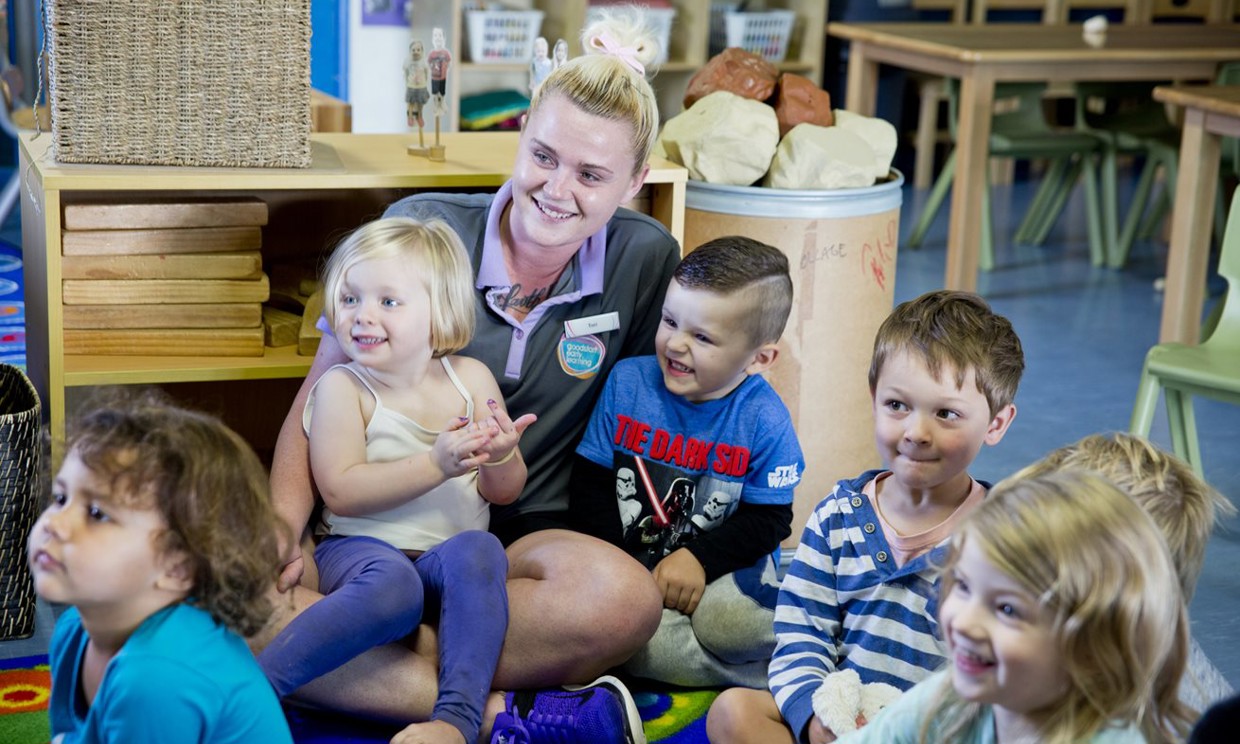Do you ever break in to song while you’re driving your children to swimming lessons? Or have a dance around the house while you’re getting dinner ready?
If the answer to those questions is yes, you’re actually engaging your little one’s brain by teaching them how to understand music, and sharing musical patterns with them.
Music therapist and founder of Boppin’ Babies music early learning music program Vicky Abad believes all children are born with musical ability, and encouraging them to explore this may help them in many different ways.
“Music engages all parts of the brain,” Ms Abad said. “When children hear music they engage through movement and often singing, which involves different brain regions such as the cerebellum and language centres. They also learn how to listen, an important pre-academic skill.”
Boppin’ Babies holds classes at Goodstart Early Learning Brighton North Road three times a week for 30 minute sessions to ensure all kindergarten children could take part.
“The children absolutely love and look forward to it, from the toddler age group right through to the kindergarten children,” centre director Janine Lyons said.
“We use the kinder fund to pay for the music program for our kindergarten children and the children are learning about music notes and how to play the glockenspiel so it’s a lot of fun.”
Research shows there are many development benefits for children when they participate in music making, such as better language, emotional, social and physical skills. It may also relate to a higher IQ and overall greater academic achievement.
Ms Abad said music education supported learning across all milestones, including academic, music and pre-academic which includes the skills needed specifically for school-readiness.
“As a music therapist and music teacher I’ve seen first-hand the benefits of music to support developmental outcomes for little people, and learning and pre-academic skills for older children.”
For 0-3 year olds, there is a focus on enjoying the different musical sounds, feeling the beat and using their bodies and moving to the music. For those aged 3-5 years old, music helps with cognitive, social, emotional, musical, physical and behavioural development.
Children at this age can also benefit from learning to hold an instrument, which helps with the ability to hold a pencil. They learn to sit still while performing, and they learn to regulate their emotions by having to wait their turn.
Parents at home can start the musical journey by:
If the answer to those questions is yes, you’re actually engaging your little one’s brain by teaching them how to understand music, and sharing musical patterns with them.
Music therapist and founder of Boppin’ Babies music early learning music program Vicky Abad believes all children are born with musical ability, and encouraging them to explore this may help them in many different ways.
“Music engages all parts of the brain,” Ms Abad said. “When children hear music they engage through movement and often singing, which involves different brain regions such as the cerebellum and language centres. They also learn how to listen, an important pre-academic skill.”
Boppin’ Babies holds classes at Goodstart Early Learning Brighton North Road three times a week for 30 minute sessions to ensure all kindergarten children could take part.
“The children absolutely love and look forward to it, from the toddler age group right through to the kindergarten children,” centre director Janine Lyons said.
“We use the kinder fund to pay for the music program for our kindergarten children and the children are learning about music notes and how to play the glockenspiel so it’s a lot of fun.”
Research shows there are many development benefits for children when they participate in music making, such as better language, emotional, social and physical skills. It may also relate to a higher IQ and overall greater academic achievement.
Ms Abad said music education supported learning across all milestones, including academic, music and pre-academic which includes the skills needed specifically for school-readiness.
“As a music therapist and music teacher I’ve seen first-hand the benefits of music to support developmental outcomes for little people, and learning and pre-academic skills for older children.”
For 0-3 year olds, there is a focus on enjoying the different musical sounds, feeling the beat and using their bodies and moving to the music. For those aged 3-5 years old, music helps with cognitive, social, emotional, musical, physical and behavioural development.
Children at this age can also benefit from learning to hold an instrument, which helps with the ability to hold a pencil. They learn to sit still while performing, and they learn to regulate their emotions by having to wait their turn.
Parents at home can start the musical journey by:
- Starting each day with a song – something simple such as Twinkle Twinkle Little Star.
- Play peek-a-boo games on the change table.
- Use music to help grumpy children transition from a sleep by having a cuddle and singing a gentle song. Research shows that the songs you love will also bring you joy and increase “feel good” hormones being released in your brain.
- Set up a bed time ritual that includes singing a favourite song before transition to the cot.


